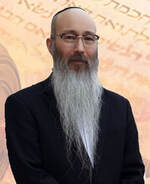|
By: HaRav Menashe Sasson מאת: הרב מנשה ששון Parashat Shemini tells us that: And Nadab and Avihu, the sons of Aharon, took each of them his censer [fire pan] and put fire in it, and put incense on it, and offered [a] strange fire before the Lord, which He commanded them not. And the fire went out from the Lord and devoured them, and they died before the Lord. Vayyiqra 10:1-2. On its face, this is a difficult pasuk to understand. HaShem killed Nadab and Avihu because they brought an incense offering that they had not been commanded to bring. To understand the reason for this apparently illogical outcome, a little background is in order. This world [עולם הזה], the physical world in which we live, is a world of duality. For example, there is hot and cold, up and down, on and off, and so on. We understand, of course, that there are many points between the two end-points which represent this duality. That understanding illustrates and emphasizes this duality, but does not refute it. The Torah itself alludes to this duality. As we know, the first word in the Torah is “Bereshit [בראשית],” which often is translated as “In the beginning.” The Hebrew alphabet, the “Aleph-Bet,” begins with the letter “Aleph” [א]. The second letter of the Aleph-Bet, not surprisingly, is the letter “Bet” [ב]. Unlike other languages, each letter of the Hebrew alphabet has a corresponding numerical value. The first letter of the Aleph-Bet, the “Aleph” [א] has a numerical value of 1. The number “one” represents HaShem, who is One. The second letter of the Aleph-Bet, the “Bet” [ב] has a numerical value of 2. The first word of the Torah, “Bereshit [בראשית],” begins with the letter “Bet” [ב] (numerical value of 2), which is an allusion to the fact that this world [עולם הזה] is a world of duality. Another duality consists of those who believe that this world [עולם הזה] was created by HaShem and, on the other hand, of those who believe this world exists due to “natural” or other causes that have nothing to do with HaShem. Those of us who believe – that is, those of us who “know” – that HaShem created this world [עולם הזה] constantly seek to “connect,” that is, to have a relationship, or to have a better, closer relationship, with HaShem. Jews do not have a monopoly on wanting to “connect” with their Creator. Both Jews and Gentiles alike, whether they realize it or not, are driven to do so. Recognizing this fact, the Sages told us that one who is obligated to perform a misva, and who does perform that misva, is greater than one who, although not obligated to perform the misva, does so voluntarily. Derashot HaRan 7:21. At first glance, the logic of this idea might seem counter-intuitive. After all, would it not be better to perform a misva voluntarily, as opposed to only performing the misva after one has been commanded to do so? In other contexts, it is often true that performing an act voluntarily is greater than fulfilling an obligation. Take, for example, the situation of a person who voluntarily gives charity or a person who pays a debt that he owes, but which he has not been commanded to pay. Most people would probably agree that the act of giving charity is more meritorious than the act of voluntarily paying one’s bills. This, of course, would be correct. But when it comes to serving HaShem, things are different. The purpose of performing misvot is to accept upon oneself the Yoke of Heaven, to bend one’s will and humble oneself before his Creator. When one performs a misva that he is commanded to perform, he thereby accepts upon himself the Yoke of Heaven by bending his will to match that of his Creator and, thereby, humbles himself before his Creator. However, the person who voluntarily performs a “misva” without having been commanded to do so has not accepted upon himself the Yoke of Heaven by bending his will to match that of his Creator. Rather, he has merely reaffirmed in his mind the correctness of his own decision that performing the misva is the proper thing to do. Thus, rather than accepting the Yoke of Heaven and humbling himself before his Creator, he has actually done exactly the opposite. He has aggrandized himself before his Creator. As previously discussed, this is a world of duality. Perhaps the most significant example of this duality is that which is represented by the question: was man created by a Devine Creator or is man, at his origin, simply the result of “natural,” unaided evolution? The answer, of course, is mutually-exclusive; it can only be one or the other. The numerical values which correspond to the characters of the Aleph-Bet provide some insight into this issue. As we know from Parasha Bereshit, HaShem created the world in six days and rested on Shabbat, the seventh day. Thus, the number 7 represents this world [עולם הזה]. It is interesting that the 7-day week has become almost universal worldwide, even though the number seven does not divide evenly into 365, the number of days in a year. Certain atheistic regimes, such as the former Soviet Union, attempted to abolish the 7-day week (in favor of a 5-day week); however, all such efforts worldwide have failed. The number 8, on the other hand, represents the spiritual world. For example, we perform Brit Milah [ברית מילה] (circumcision) on the eighth day after a baby boy is born. One reason that has been given for this is that because the number 7 (which represents HaShem’s absolute sovereignty over this world) + 1 (which represents HaShem, who is One), equal 8. Other examples of the number 8 representing the spiritual is Hannukah, which celebrates for eight days the Jewish defeat of the Greeks, who sought to annihilate Jewish spirituality; the eight strands which are attached to each of the four corners of a Tallit; and the eight special garments that were worn by the Kohen Gadol while serving in the Beit Hamikdash. The significance of the number 8 is also present in Parashat Shemini. The Priestly service in the Mishkan reached its pinnacle on the eighth day of the inauguration service, when Aharon and his sons Nadab and Abihu were consecrated as Kohanim. With this background, we now return to Parashat Shemini. Nadab and Abihu, in their zeal to serve HaShem, brought an offering that HaShem had not commanded them to bring. However, rather than being rewarded for voluntarily performing a “misva” that they had not been commanded to perform, HaShem summarily executed both of them. And Nadab and Avihu, the sons of Aharon, took each of them his censer [fire pan] and put fire in it, and put incense on it, and offered [a] strange fire before the Lord, which He commanded them not. And the fire went out from the Lord and devoured them, and they died before the Lord. Vayyiqra 10:1-2. The lesson to be learned from Nadab and Avihu is one of duality, that of serving HaShem in a correct manner, on His terms, and not in an incorrect manner, on our terms. This applies to both Jew and Gentile alike. For Jews, this means following the Halachic rulings of authoritative and respected rabbis. For rabbis, it means being careful when issuing Halakhic rulings to ensure that such rulings, first and foremost, reflect, and do not abrogate, Biblical requirements and, secondly, that such rulings, while taking into account relevant Halakhic precedent, also give appropriate consideration and weight to the specific facts and circumstances which exist at the time and place where the Halakhic ruling is being given. For Gentiles, this means learning and following the Seven Laws of Noah, preferably with the guidance of a competent rabbi, and by not creating a new religion through the voluntary performance “misvot” that one is not commanded or allowed to perform. For both Jew and Gentile alike, the lesson to be learned is that we must serve HaShem on His terms, and not, as did Nadab and Avihu, on our terms, by creating a new religion. That is, we must not create a “strange fire before the Lord, which He commanded [us] not.” We can now better understand what our Sages meant when they taught that one who is obligated to perform a misva and who performs that misva, is greater than one who, although not obligated to perform a particular misva, does so voluntarily. Derashot HaRan 7:21. May we all be blessed to connect with HaShem by accepting upon ourselves the Yoke of Heaven; that is, by bending our will and humbling ourselves before our Creator. שבת שלום Shabbat Shalom! Copyright © The Israel Foundation. All Rights Reserved.
0 Comments
Your comment will be posted after it is approved.
Leave a Reply. |
THE ISRAEL FOUNDATION


